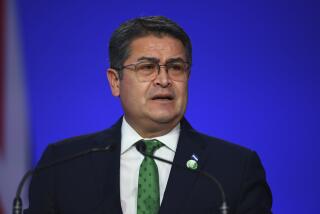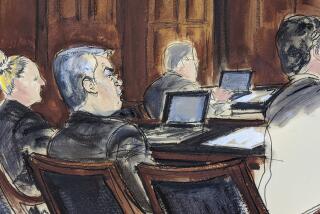Noriega Told He Must Face Trial in U.S.
MIAMI — A federal judge Thursday rejected claims that Manuel A. Noriega should be transferred to a neutral country as a prisoner of war and ruled that he must stand trial in a U.S. civilian court on drug conspiracy charges.
Prosecutors told U.S. District Judge William M. Hoeveler that they will be ready to try the ousted Panamanian dictator by year’s end. But defense lawyer Frank A. Rubino said that the trial could be delayed for up to two years because of the complexities involved in obtaining thousands of sensitive government files needed by the defense.
Both sides estimated that the historic trial will last 10 months to a year.
Hoeveler seemed exasperated by the time estimates. He shook his head at one point and said: “I’m just contemplating the length of time we’re talking about.”
But he vowed to do everything he could to move the proceedings along.
“The important thing in this case is that we not let it flounder,” he said. “This case is too important to let it drift.”
Hoeveler issued his ruling on jurisdiction two weeks after Rubino contended that the fallen general should be considered a prisoner of war because he surrendered to U.S. military authorities after the U.S. invasion of Panama on Dec. 20. Rubino said that Noriega should be transferred to a neutral country pending a trial there, in Panama or in the World Court at The Hague in the Netherlands.
Last week, the Justice Department agreed to treat Noriega as a POW. But, under the 1949 Geneva Convention, POWs may be tried for ordinary crimes in a civilian court as long as soldiers of the host country would be considered criminals for the same offenses, department lawyers argued.
“The Geneva Convention clearly authorizes a prosecution of this sort,” Deputy Solicitor General William P. Bryson told Hoeveler Thursday, noting that Noriega was indicted by two federal grand juries in Florida in February, 1988, on charges of taking millions of dollars in bribes to help Colombian drug gangs smuggle cocaine into the United States through Panama.
Hoeveler agreed with the Justice Department’s reasoning, saying: “I don’t find under the Geneva Convention that I must divest myself of jurisdiction.”
Noriega, dressed in his khaki military uniform as he sat behind his lawyers, showed no emotion when Hoeveler’s ruling was translated for him. Hoeveler acknowledged that his original March 5 trial date was unrealistic, but he did not set a new date.
Government attorneys said that they were proceeding under terms of the Classified Information Procedures Act to examine “tens of thousands of documents” that may relate to Noriega’s work as a secret informant for the CIA and the U.S. Drug Enforcement Administration over more than two decades.
Rubino has said that Noriega’s defense against drug-trafficking charges may involve claims that U.S. intelligence agents condoned his links to notorious Colombian drug dealers as long as he supplied valuable information about their activities, and other matters, to the U.S. government.
Hoeveler said he hoped to rule within two to three weeks on requests by five co-defendants that they receive separate trials. Noriega’s lawyers privately are encouraging the move in anticipation that the government will have to expose some of its key witnesses to cross-examination if earlier trials are held for his former associates.
In another development Thursday, the British High Court ordered British banks to freeze accounts linked to Noriega. British investigators believe Noriega could be holding up to $845,000 in British banks. The Justice Department believes accounts controlled by Noriega in Europe total more than $10 million.
More to Read
Sign up for Essential California
The most important California stories and recommendations in your inbox every morning.
You may occasionally receive promotional content from the Los Angeles Times.










